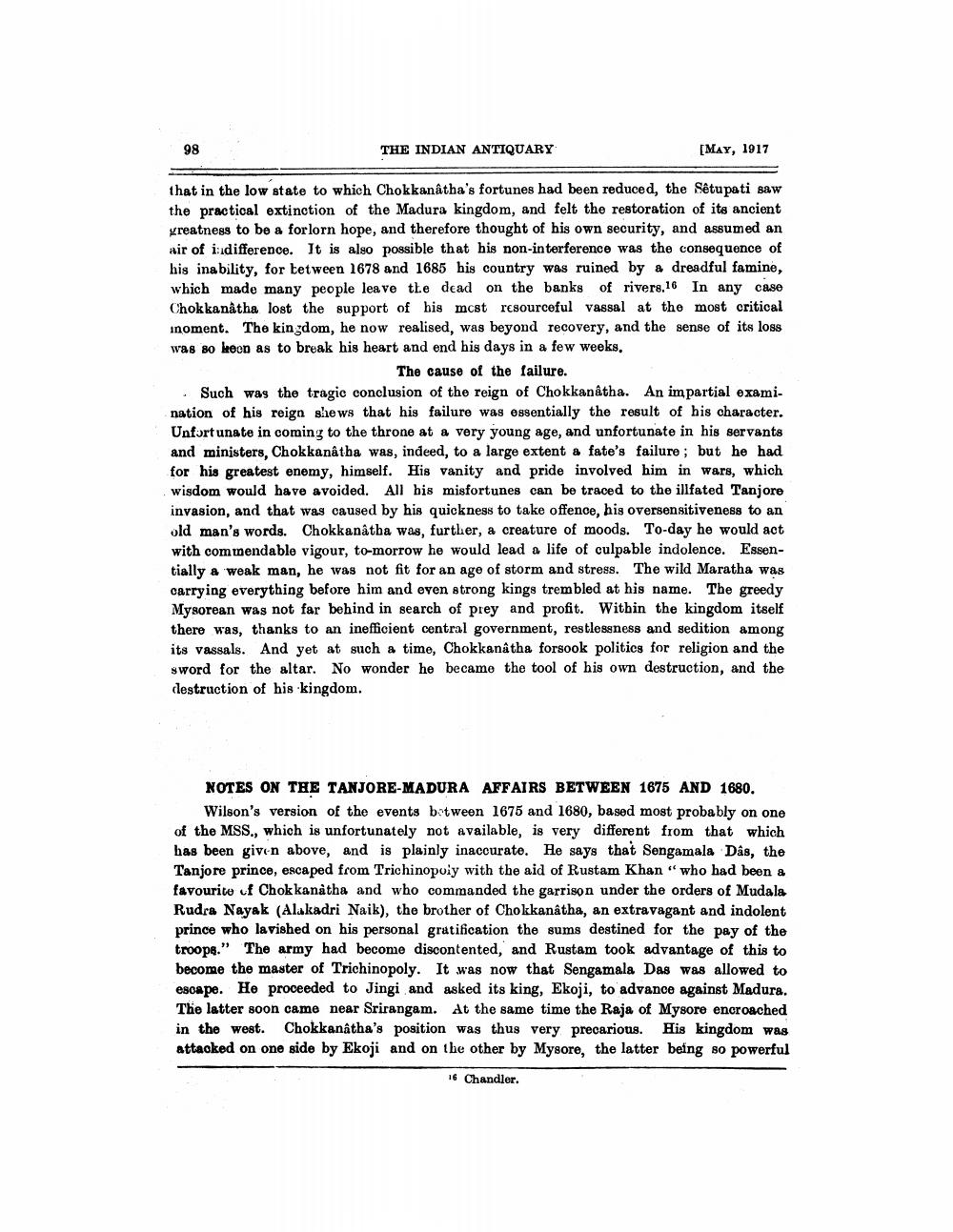________________
98
THE INDIAN ANTIQUARY
[May, 1917
that in the low state to which Chokkanatha's fortunes had been reduced, the Sêtupati saw the practical extinction of the Madura kingdom, and felt the restoration of its ancient yreatness to be a forlorn hope, and therefore thought of his own security, and assumed an air of is difference. It is also possible that his non-interference was the consequence of his inability, for between 1678 and 1685 his country was ruined by a dreadful famine, which made many people leave the dead on the banks of rivers,16 In any case Chokkanatha lost the support of his most resourceful vassal at the most critical inoment. The kingdom, he now realised, was beyond recovery, and the sense of its loss was so hoon as to break his heart and end his days in a few weeks.
The cause of the failure. Such was the tragic conclusion of the reign of Chokkanatha. An impartial examination of his reign shews that his failure was essentially the result of his character. Unfortunate in coming to the throne at a very young age, and unfortunate in his servants and ministers, Chokkanatha was, indeed, to a large extent a fate's failure; but he had for his greatest enemy, himself. His vanity and pride involved him in wars, which wisdom would have avoided. All bis misfortunes can be traced to the illfated Tanjore invasion, and that was caused by his quickness to take offence, his oversensitiveness to an old man's words. Chokkanatha was, further, a creature of moods. To-day he would act with commendablo vigour, to-morrow he would lead a life of culpable indolence. Essentially a weak man, he was not fit for an age of storm and stress. The wild Maratha was carrying everything before him and even strong kings trembled at his name. The greedy Mysorean was not far behind in search of prey and profit. Within the kingdom itself there was, thanks to an inefficient central government, restlessness and sedition among its vassals. And yet at such a time, Chokkana tha forsook politics for religion and the sword for the altar. No wonder he became the tool of his own destruction, and the destruction of his kingdom.
NOTES ON THE TANJORE-MADURA AFFAIRS BETWEEN 1675 AND 1680.
Wilson's version of the events between 1675 and 1680, based most probably on one of the MSS., which is unfortunately not available, is very different from that which has been given above, and is plainly inaccurate. He says that Sengamala Dås, the Tanjore prince, escaped from Trichinopoly with the aid of Rustam Khan "who had been a favourite of Chokkanátha and who commanded the garrison under the orders of Mudala Rudra Nayak (Alakadri Naik), the brother of Chokkanatha, an extravagant and indolent prince who lavished on his personal gratification the sums destined for the pay of the troope." The army had become discontented, and Rustam took advantage of this to become the master of Trichinopoly. It was now that Sengamala Das was allowed to escape. He proceeded to Jingi and asked its king, Ekoji, to advance against Madura. The latter soon came near Srirangam. At the same time the Raja of Mysore encroached in the west. Chokkanatha's position was thus very precarious. His kingdom was attacked on one side by Ekoji and on the other by Mysore, the latter being so powerful
16 Chandler.




